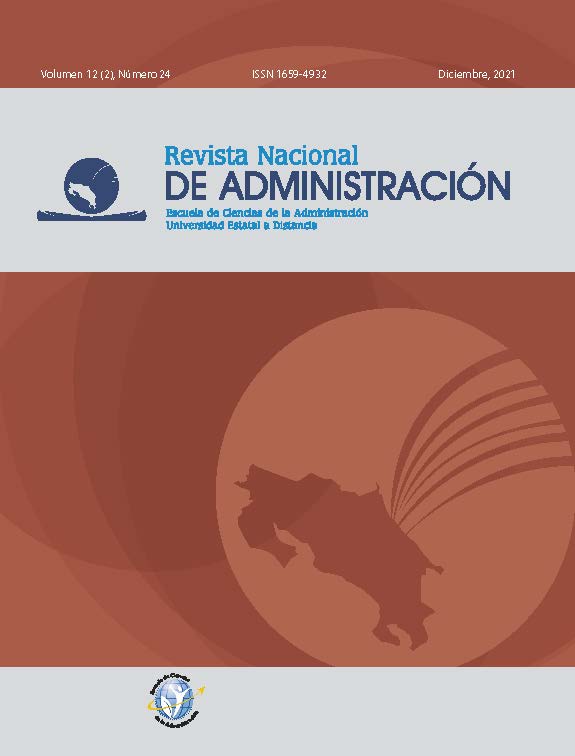Implementing the SDGs in local contexts: overcoming methodological boundaries
DOI:
https://doi.org/10.22458/rna.v12i2.3769Keywords:
SOCIAL AND SOLIDARITY ECONOMY ENTERPRISES AND ORGANIZATIONSAbstract
The research suggests how the full potential of the enterprises and organizations of the Social and Solidarity Economy in promoting sustainable development may be better understood by representing cultural, social, economic, and environmental issues within an integrated analytical framework. On these premises, an extended version of Coraggio’s scheme (2015) is obtained by adding a fourth sector of economic activity, namely the global economy, as opposed to the popular economy. Looking at Coraggio’s integrated scheme, an additional institutional space related to the social and solidarity economy emerges, representing the field of digital solidarity and cooperation. Then, the research helps to clarify what a local context is and how it relates to the notion of place. Finally, the notion of place is contrasted with the notion of system, as the attractiveness of the former depends on its distinctive features, while the latter emphasizes the instrumental value of its elements.
References
Broumas, A. (2017). The Ontology of the Intellectual Commons. International Journal of Communication, 11, 1507-1527. https://ssrn.com/abstract=2910269.
Coraggio, J.L. (2015). Institutionalizing the Social and Solidarity Economy in Latin America. In P. Utting (ed.), Social and solidarity economy: Beyond the fringe. Zed Books.
Fonteneau, B. & Pollet, I. (eds.). (2020). The Contribution of the Social and Solidarity Economy and Social Finance to the Future of Work. ILO.
Georgiou, M. (2020). Solidarity at the Time of COVID-19: An (Other) Digital Revolution? LSE Blogs. https://blogs.lse.ac.uk/medialse/2020/03/30/solidarity-at-the-time-of-covid-19-another-digital-revolution/.
Hirschman, A. O. (1970). Exit, voice, and loyalty: Responses to decline in firms, organizations, and states. Harvard University Press.
Jenkins, H., Yi, I., Bruelisauer, S. & Chaddha, K. (2021). Guidelines for Local Governments on Policies for Social and Solidarity Economy. UNRISD.
Kawano E. (2013). Social Solidarity Economy: Toward Convergence Across Continental Divides. UNRISD. https://www.unrisd.org/thinkpiece-kawano.
Kuklys, W. & Robeyns, I. (2005). Sen's Capability Approach to Welfare Economics. In Amartya Sen's Capability Approach. Springer.
North, D. C. (1990). Institutions, Institutional Change and Economic Performance. Cambridge University Press.
Nyssens, M. (1997). Popular Economy in the South, Third Sector in the North: Are They Signs of a Germinating Economy of Solidarity? Annals of Public and Cooperative Economics, 68(2), 171-200.
Pérez-Luño, A. E. (2016). Le generazioni dei diritti umani. Ordines, (2), 25-37.
Pocar, F. (2018). ‘Generazioni’ di diritti umani e diritti umani delle generazioni future. Rendiconti, 152. https://doi.org/10.4081/let.2018.532.
Réseau Intercontinental de Oromotion de l'Économie Sociale Solidaire [RIPESS]. (2015). Global Vision for a Social Solidarity Economy: Convergences and Differences in Concepts, Definitions and Frameworks. RIPESS. www.ripess.org/wp-content/uploads/2015/02/ RIPESS_Global-Vision_EN.pdf.
Salustri, A. & Viganò, F. (2018). The Contribution of the Non-Profit Sector in Narrowing Spatial Inequalities: Four Cases of Inter-Institutional Cooperation in Italy. In P. Bance et al. (eds.), Providing Public Goods and Commons. Towards Coproduction and New Forms of Governance for a Revival of Public Action (vol. 1). CIRIEC-Université de Liège.
Salustri, A., Delio, M. & Miotti, G. (2018). Domanda ed offerta di sviluppo sostenibile: verso un modello di governance condiviso? AISRE XXXIX Conferenza Scientifica Annuale, Bolzano. https://www.aisre.it/images/aisre/5b990dde94fdb4.38559089/Salustri1_.pdf.
Salustri, A. (2021). Exit strategies o giustizia sociale? Un approfondimento sulla crisi innescata dal covid-19. Public Finance Research Papers (48). DSGE-Sapienza University of Rome.
Shah, M. M. (2008). Sustainable Development Encyclopedia of Ecology (2.a ed.). Elsevier.
Talan, A., Tyagi, R. D. & Surampalli, R. (2020). Social Dimensions of Sustainability. Sustainability: Fundamentals and Applications, 183-206. https://doi.org/10.1002/9781119434016.ch9
Throsby, D. (1995). Culture, Economics and Sustainability. Journal of Cultural economics, 19(3), 199-206.
United Nations [UN]. (2020). The Sustainable Development Goal Report. UN. https://unstats.un.org/sdgs/report/2020/.
United Nations Industrial Development Organization [UNIDO]. (2017). The Role of the Social and Solidarity Economy in Reducing Social Exclusion. Budapest Conference Report. UNIDO. https://www.unido.org/events/conference-role-social-and-solidarity-economy-reducing-social-exclusion.
United Nations-Inter Agency Task Force on Social and Solidarity Economy [UNTFSSE]. (2021). What Role for the Social and Solidarity Economy in the post-Covid-19 Crisis Recovery? UNTFSSE Statement. UN. https://unsse.org/wp-content/uploads/2020/09/UNTFSSEStatement-on-COVID-19-June-2020.pdf.
UNTFSSE. (2014). Social and Solidarity Economy and the Challenge of Sustainable Development. Socioeco.org. http://www.socioeco.org/bdf_fiche-document-3229_es.html.
Western Cape Education Department [WCED].1987. Our common future. Oxford University Press.
van Zeeland, A. (2014). The Interaction Between Popular Economy, Social Movements and Public Policies: A Case Study of the Waste Pickers' Movement. UNRISD Occasional Paper, (11). https://www.unrisd.org/80256B3C005BCCF9/(httpAuxPages)/9B3DDB4A7EC7B9CDC12 57D4E002F347E/$file/OP11%20van%20Zeeland.pdf
Published
How to Cite
Issue
Section
License
Aquellos autores/as que tengan publicaciones con esta revista, aceptan los términos siguientes:
- Los autores/as conservarán sus derechos de autor y garantizarán a la revista el derecho de primera publicación de su obra, el cuál estará simultáneamente sujeto a la Licencia de reconocimiento de Creative Commons que permite a terceros compartir la obra siempre que se indique su autor y su primera publicación esta revista.
- Los autores/as podrán adoptar otros acuerdos de licencia no exclusiva de distribución de la versión de la obra publicada (p. ej.: depositarla en un archivo telemático institucional o publicarla en un volumen monográfico) siempre que se indique la publicación inicial en esta revista.
- Se permite y recomienda a los autores/as difundir su obra publicada en la revista a través de Internet (p. ej.: en archivos telemáticos institucionales o en su página web).

